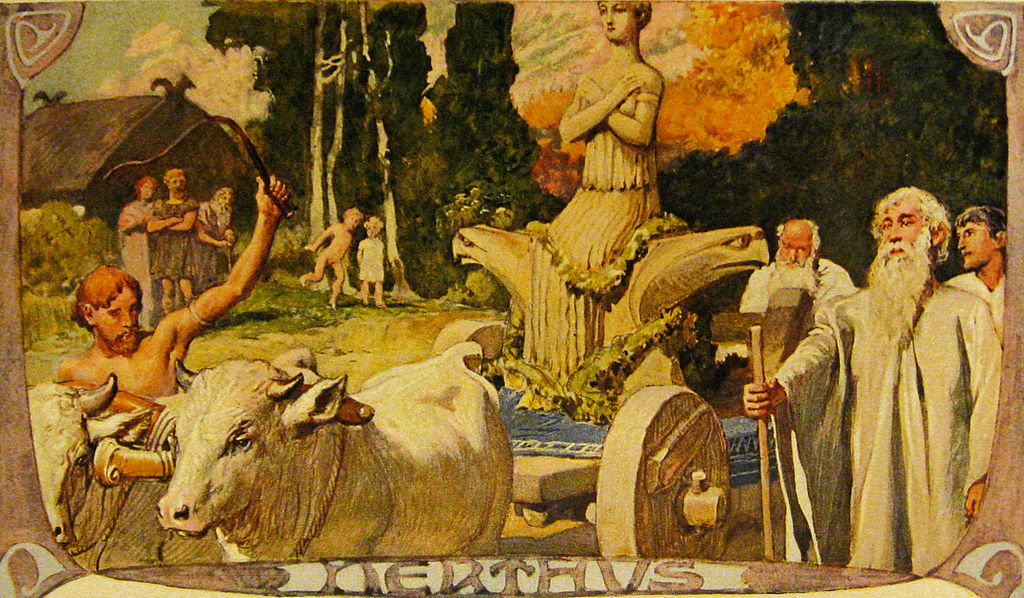Nerthus was referenced as Terra Mater (or Mother Earth) in Germania (historical book) by the Roman historian Tacitus. When we compare Tacitus’ account of Nerthus to that of Njord, there is much that these two Vanir gods share in common, and some even think they are the same person.
In Germania, historical and ethnographic book on the Germanic people outside the Roman Empire written around 98 AD, Tacitus goes into great detail about Nerthus and the island tribes that worship the goddess Nerthus. Her arrival is marked by much celebration, and war and fighting comes to a stop when Nerthus arrives.
Let’s dive into who Nerthus was and what role she played in Norse mythology.
What is Nerthus the Goddess of?
Nerthus, or her Proto-Germanic name Nerþuz, is an incarnation of Mother Earth and a fertility goddess.
In Germania, Tacitus notes that Nerthus is worshiped by the Suebi tribes in Northern Europe near a sacred grove where her cart sits draped in a cloth. When this Germanic goddess visits, her appearance is met with much celebration. Iron objects are put away, and war grinds to a halt. She is the corporeal manifestation of Mother Earth and, thus, treated with praise, peace, celebration, and respect by the people of Scandinavia and Denmark.
This account is the only mention of Nerthus. However, while her appearance is brief, it lends plenty of clues about this goddess found in the Prose Edda and the Poetic Edda. There appear to be ties between Tacitus’ account of Nerthus and the accounts of Njord in Old Norse texts. One could surmise that Nerthus and Njord are related in some way.
Is Nerthus Njord?
The origins of Nerthus and Njord (or Njörðr) are hotly contested among historians. Some feel they are the same, while others think they are closely related.
Some even go so far as to discredit Tacitus entirely since his account in Germania is speculated to come second-hand.
Let’s look at some theories, and you can decide which sounds more plausible.
Nerthus was Njord’s consort
One of the reasons that many historians discount Nerthus and Njord as being the same person is that Nerthus is a woman, and Njord is a man.
In the Ynglinga Saga by Snorri Sturluson, there is a brief mention that Njord (the god of the sea) had a wife (his sister). Since Nerthus and Njord share a similar etymology, it can be deduced that Tacitus’ Nerthus was Njords wife.
Nerthus and Njord are the same deity
Much like Frigg and Freyja are hypothesized to be the same person, the same can be said for Nerthus and Njord.
Since Nerthus is only mentioned in a retelling of Viking deities, it’s entirely possible that Tacitus was mistaken. Since the Germania is considered a second-hand account, it’s quite possible that Tacitus was wrong and Nerthus was male. Or, Nerthus has a sex change.

What is Nerthus’ Role In Norse Mythology?
Nerthus was a member of the Vanir gods, which aren’t as notable or influential as the Æsir gods. Nerthus’ role as a Vanir god was the incarnation of Mother Earth. As a fertility goddess, her presence was celebrated and revered. She brought peace, prosperity, and celebration when visiting the Scandinavian tribes.
The Æsir consist of recognizable Norse gods such as Thor, Loki, and Odin that live in Asgard. The fertility Vanir deities, like Nerthus, Freyr, Freyja, Njord, live in Vanaheim.
*Make sure to also check my article titled Germanic Paganism Vs. Norse Paganism.
Why Is There So Little Known About Nerthus?
As with much of Norse mythology, there are plenty of mysteries, and the Norse goddess Nerthus is no exception.
This Norse diety doesn’t appear in any historical Norse texts like the Poetic Edda or even the Prose Edda. The Germania was written by a Roman historian who never, in fact, traveled to Northern Europe. The information compiled in Germania was like a long game of telephone.
While she shares many characteristics with the Norse god Njord, Nerthus may be related to Njord, or she may be the same person as Njord. With very few surviving texts, the origins and role of Nerthus in Norse mythology will remain a mystery.

